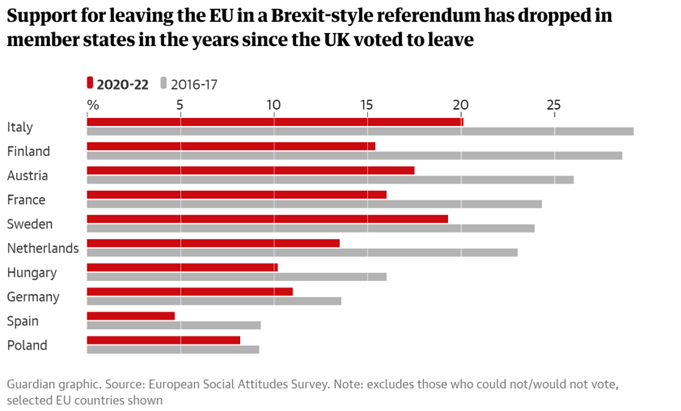“Europe as a Nation”. Extreme Right and Euroscepticism: necessarily synonymous?
Source: Flickr
As the European Parliament election approaches in June, a decisive shift to the right in the European Parliament seems imminent, at least according to projections. There is concern about the possibility, supported by at least numerical evidence, of a right-wing coalition bringing together the christian democrats of the EPP, the conservatives of the ECR, and the far-right of ID for the first time in history, following a similar pattern to what supports Meloni's government (and in a sense, addressing the inconsistency of political forces allied in government voting differently in Europe).
The hypothesis of the end of the egemonic centrist super-coalition is particularly alarming for the eurosceptic (and sometimes straightly anti-european) positions that some populist right-wing parties have expressed. Could the rightward turn of the European helm lead to the sinking of the European ship? The answer is perhaps, but more likely no. The European Social Survey (ESS), led by City, University of London, a survey conducted every two years aiming to highlight the opinions of citizens in 30 European nations regarding the possibility of a Brexit-style exit from the European Union, shows us how in 2020-2022 the arguments in favor of such a solution have radically and uniformly lost support compared to 2016-2017.
This is mainly due to the political and economic instability in the UK that has resulted from Brexit, as well as the (overall) prompt and united responses that the European Union has given to the recent crises of Covid and the conflict in Ukraine. Political forces not trusting Europe (enjoying a certain prominence for example in France and Italy) are progressively abandoning anti-European rhetoric. Discourses against the euro and for "Italexit", heard for example from representatives of the League in Italy, seem substantially anachronistic. In the mean time, we can see a growing involvement of Italian Prime Minister Giorgia Meloni, president of the ECR, in actively participating for a reform of the EU for a continuation of objectives that essentially unite the right throughout Europe (such as a "clear" resolution of the migration crisis, to be addressed by the Union together).
The possibility of a total abandonment of Euroscepticism by European right-wing parties, in favor of a stance of united action for reform, is -- depending on the interpretations that can be given -- a future that is just waiting to manifest itself for two reasons.
The first is almost definable as "logical": it appears evident that the eventual success of parties affirming the primacy of their respective national interests over the communal one, by definition in contrast, in the long-term necessarily leads to an unstable and constantly stalled system. Furthermore, logically, this leads to the impossibility of genuine collaboration by such political forces at the European level and thus to significant influence.
The second reason is rather "historical": for example, consider how the British Oswald Mosley of the Union Movement proposed his idea of "Europe as a Nation" as early as 1948, inspired in part by the ideas of Benito Mussolini's Italian Social Republic (ironic to think that such a proposal came from the United Kingdom). The Frenchman Le Pen of the National Front stated in 1985, "[t]he European Union is to remain a utopia as long as the Community will not dispose of sufficient resources, of a common currency and of a political will inseparable from defence capacity", and in general, Mosley's doctrine found agreement and resonance in all the extreme right-wing parties of the continent, both in an ethno-Europeanist key and with the interpretation of the European Union as a counterweight to the USA and USSR. In the 1990s, the idea began to fade, with the end of the Cold War and the creation of a unipolar world led by the United States it is likely that the second prerequisite went missing. But it was only following the Maastricht Treaty in 2002 that across Europe (both in an anti-establishment key and to increase electoral consensus), the right-wing parties shifted towards Euro-sceptic positions. The German Republicaner defined the treaty as a "Versailles without War".
One might therefore think that the multipolarization of the world we are observing, as well as an entropic tendency towards integration, could be indicative of a new beginning (or rather a return to the past) for the extreme right-wings throughout Europe? While it is true that time is cyclical, as is often the case in the political life of nations, this is one of those questions that only time will answer.
Sources
Almeida, D. (2010). Europeanized Eurosceptics? Radical right parties and European integration
















Yorumlar